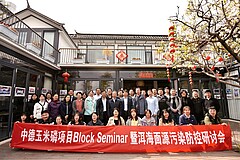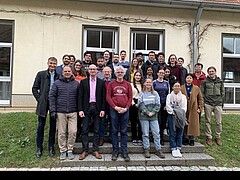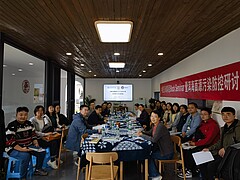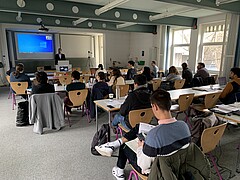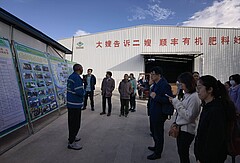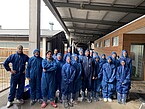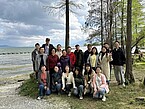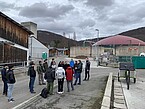Fourth Block Seminar of the 2nd Generation [07.12.23]
The fourth block seminar of the 2nd generation of IRTG AMAIZE-P (post-)doctoral researchers was held in Dali, Yunnan province, China and at the University of Hohenheim from March 20-24, 2023, in hybrid format.
The overall topic of the 4th block seminar of the 2nd generation was “P Nutrition and Recovery” and covered the topics of Subject Area (SA) 3. Seven high-level invited speakers from universities in China, Germany, Italy and Peru, from a high school in Bavaria (Germany), and from German companies were invited to give scientific and technological lectures on 20 and 22 March, with three of these held in presence in Hohenheim, and the others remotely. The joint presentations (progress reports) by the (post-)doctoral researchers on the Chinese and German sides were held on 21 and 23 March 2023.
The block seminar was held in presence in a lecture hall in Dali, Yunnan Province, as well as in two lecture halls at the University of Hohenheim, connected live via an online platform. The total number of participants was about 60 on the Chinese and around 50 on the German side. Hereof, up to 22 online participants were simul-taneously counted. This 4th block seminar continued the hybrid format which had been established during the preceding block seminars. The online presentations and lectures were recorded via the online platform’s recording function, and the resulting MP4 video files will be made available for educational purposes (upon request for IRTG AMAIZE-P members only).
Educational programme
As first extra educational programme, a 1-day “Biostatistics Workshop” (in presence) was organized for the (post-)doctoral researchers of the 2nd generation on the German side on 09 March 2023. The workshop was given by Prof. Dr. Hans-Peter Piepho and Dr. Jens Hartung of the Biostatistics Unit of the Institute of Crop Science at the University of Hohenheim. Prior to the workshop, the participants were asked to prepare a brief description of their research topic and the statistical issues arising in their work so far. These specific statistical questions and problems raised in advance were then discussed during the workshop. This was the first such workshop offered in the framework of this IRTG and it was of great benefit for the doctoral researches at the present stage of their work (see separate item).
An interactive educational workshop on “Pitching your research to a target audience” was given by Prof. Dr. Susanne Schmidt from the University of Queensland in Australia on the third day of the block seminar (22 March). The session was in presence for the PhD students on the German side, and the PhD students on the Chinese side, respectively, connected via the online platform. The PhD students had the opportunity to send an abstract beforehand which would then be selected for discussion in the session. The abstracts were prepared following a structure recommended by the editorial staff of the journal Nature. Several abstracts that were sent in were jointly discussed by Susanne Schmidt together with the participants, on possibilities for improvement. The session was very well received and the presentation, together with the improved abstracts, was provided to all participants.
Excursions
On the Chinese side, several half-day excursions in and around Dali were organized in the mornings. They included visits to several “Science & Technology Backyard Models” including experimental fields, a visit to an organic fertilizer factory producing organic fertilizers from local sources (animal manure and vegetable residues), as well as a visit to a dairy farm.
On the German side, a half-day excursion to the town of Esslingen with a long history of wine-making was organized on 23 March 2023. It started with a guided visit of the Kessler Sektkellerei and its cellars, the first company in Germany to produce sparkling wine using the French “champenoise” method, where the second fermentation takes place in the bottle. This was followed by a short guided tour of the medieval town offered by Ms. Andrea Zeh. The visit was concluded with a dinner in a traditional restaurant and wine cellar.
The following day (24 March 2023) a whole-day excursion to the experimental station “Unterer Lindenhof” of the University of Hohenheim near Eningen unter Achalm took place. A total of 24 persons participated. First the station head, Mr. Alexander Hauser, gave a general introduction to the station “Lindenhöfe”. This was followed by a morning visit to the Biorefinery Technicum of the Institute of Agricultural Engineering of the University of Hohenheim, with detailed introduction by Prof. Dr. Andrea Kruse and by Chief Research Engineer Mr. Maciej Olzsewski. This was followed by a visit of the pig facility, organized by Ms. Prof. Dr. Amélia Camarinha Silva, with introduction by Mr. Christoph Albert of the station and Mr. Moritz Novotny of the IRTG. In the afternoon, a visit of the biogas plant at the Unterer Lindenhof Station, and related installations, incl. an LNG plant under construction, was organized by the State Institute of Agricultural Engineering and Bioenergy. Dr. Hans Oechsner and doctoral candidate Ms. Naga Sai Uppuluri gave a detailed introduction of the facilities and ongoing experiments, including liquid-solid separation of the biogas digestate, etc.
An Advisory Board meeting, including the German and Chinese Principle Investigators (PIs) and Senior Researchers of the IRTG AMAIZE-P was held (in hybrid format) as first session on 23 March, 2022. It was chaired by the Spokesperson on the German and the Scientific Coordinator on the Chinese side, respectively. Issued touched were challenges following the return to ”live” presentations after the end of the Covid-19 pandemic, as well as so-called “predatory journals”.

